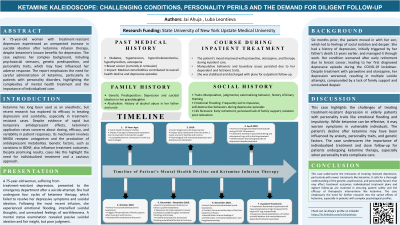Suicidality and Behavioral Emergencies
(184) Ketamine Therapy in Complex Cases: A Cautionary Tale of Exacerbated Personality Traits and the Crucial Role of Comprehensive Follow-Up and Psychosocial Interventions


Jai Ahuja, MBBS
Clinical Observer
SUNY Upstate Medical University
Syracuse, New York.jpg)
Luba Leontieva, MD, PhD
Associate Professor of psychiatry, inpatient unit director
SUNY Upstate Medical University
Syracuse, New York
Presenting Author(s)
Co-Author(s)
Background
This report investigates the paradoxical exacerbation of suicidal thoughts in a 75-year-old South Asian woman with treatment-resistant depression after ketamine therapy, despite ketamine's known antidepressant effects and subsequent US food and Drug Administration approval (Yavi et. al, 2022). It highlights the drug's complex effects and its potential risks, especially for patients with complex backgrounds or personality disorders.
Case
The patient is a South Asian immigrant with a history of breast carcinoma in remission and treatment-resistant depression, who experienced worsened depressive symptoms and suicidal ideation after four ketamine therapy sessions, and presented to the emergency department after two suicide attempts in 45 days. The patient had historically displayed ego strength, with resilience against life's adversities including immigration, separation, breast cancer, and subsequent early retirement. The patient's psychosocial background, characterized by significant losses, a lack of meaningful connections, and a relocation that left her feeling unsupported by her family, accentuated the therapeutic challenge. She also presented with personality traits which were suggestive of narcissistic and borderline tendencies.
Discussion
Studies suggest that ketamine may increase impulsiveness and suicidality in some, particularly those with borderline personality disorder (Vanciek et al., 2022). The patient's post-treatment anxiety and suicidality might stem from her personality, cultural beliefs, and ketamine's acute effects (Ceban et al., 2021). Anxiety during ketamine treatment can predict worse outcomes (Aust et al., 2019), and its impact on enhancing traumatic memories may trigger emotional distress in vulnerable individuals (Sluzenski et al., 2006).
Conclusion
The report concludes that despite various recognized benefits, ketamine may pose risks for those with atypical personality traits or diverse cultural beliefs. It recommends a cautious approach to its use and suggests complementary therapies such as Dialectical Behavioral Therapy for complex cases.
References
Yavi M, Lee H, Henter ID, Park LT, Zarate CA Jr. Ketamine treatment for depression: a review. Discov Ment Health. 2022;2(1):9. doi: 10.1007/s44192-022-00012-3. Epub 2022 Apr 15. PMID: 35509843; PMCID: PMC9010394.
Vanicek T, Unterholzner J, Lanzenberger R, Naderi-Heiden A, Kasper S, Praschak-Rieder N. Intravenous esketamine leads to an increase in impulsive and suicidal behaviour in a patient with recurrent major depression and borderline personality disorder. World J Biol Psychiatry. 2022 Nov;23(9):715-718. doi: 10.1080/15622975.2022.2031287. Epub 2022 Mar 8. PMID: 35057708.
Ceban F, Rosenblat JD, Kratiuk K, Lee Y, Rodrigues NB, Gill H, Subramaniapillai M, Nasri F, Lui LMW, Lipsitz O, Kumar A, Lee JG, Chau EH, Cao B, Lin K, Ho RC, Mansur RB, Swainson J, McIntyre RS. Prevention and Management of Common Adverse Effects of Ketamine and Esketamine in Patients with Mood Disorders. CNS Drugs. 2021 Sep;35(9):925-934. doi: 10.1007/s40263-021-00846-5. Epub 2021 Aug 7. PMID: 34363603.
Aust S, Gärtner M, Basso L, Otte C, Wingenfeld K, Chae WR, Heuser-Collier I, Regen F, Cosma NC, van Hall F, Grimm S, Bajbouj M. Anxiety during ketamine infusions is associated with negative treatment responses in major depressive disorder. Eur Neuropsychopharmacol. 2019 Apr;29(4):529-538.
Sluzenski J, Newcombe NS, Kovacs SL. Binding, relational memory, and recall of naturalistic events: a developmental perspective. J Exp Psychol Learn Mem Cogn. 2006 Jan;32(1):89-100. doi: 10.1037/0278-7393.32.1.89. PMID: 16478343.
Presentation Eligibility: Not previously published or presented.
Diversity, Equity, and Inclusion: This case report underscores the importance of culturally sensitive care in treating complex psychiatric conditions in diverse populations. Highlighting a 75-year-old South Asian woman's ketamine therapy journey, it emphasizes the influences of cultural background, immigration status, and medical history on treatment outcomes. Additionally, the collaboration between a medical trainee from India and an attending at SUNY Upstate Medical University enriches the research, demonstrating the value of diverse perspectives and mentorship in healthcare. This partnership aims to enhance patient care for those with unique, multifaceted needs, advocating for a more inclusive approach in medical practice.

